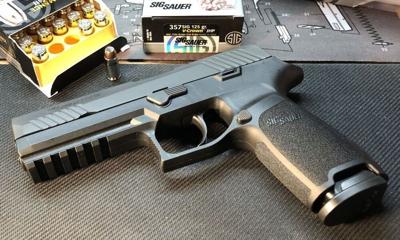
Sig Sauer Model P320 pistol
KANSAS CITY — A federal judge has granted class certification in a consumer protection lawsuit alleging that Sig Sauer’s Model P320 pistol is defectively designed.
In an order addressing Joshua Glasscock’s motion for class certification, the court certified a Missouri-only class under Federal Rule of Civil Procedure 23(b)(3) for purchasers of certain P320 pistols, concluding that the requirements of numerosity, commonality, typicality, adequacy, predominance and superiority were met, according to the order filed in the U.S. District Court for the Western District of Missouri, Southern Division.
The court also rejected the defendant’s threshold standing challenges and approved a notice plan intended to reach the vast majority of potential class members.
The case centers on a putative class action brought under the Missouri Merchandising Practices Act (MMPA).
Glasscock, a Polk County resident, alleges the P320 has a three-part design defect that renders the pistol unreasonably dangerous in its reasonably anticipated use.
According to the complaint and motion record, the three components are: the pistol is effectively fully energized and ready to fire the instant a round is chambered; it has a minimal trigger pull because it is short and lightweight; and it lacks any safety features.
The plaintiff contends Sig Sauer knew or should have known of the alleged defect when it designed, manufactured and marketed the pistol, and that, had the true nature of the product been disclosed, he and other consumers would not have purchased the firearm or would have paid substantially less.
The court certified the following class: “All persons who purchased a Sig Sauer model P320 pistol without an external thumb safety primarily for personal, family or household purposes in the state of Missouri from September 1, 2017, through the present.” The order excludes “(1) individuals who have filed an individual action against Sig Sauer related to the P320, or (2) individuals who no longer own a P320 pistol without an external thumb safety.”
Before reaching Rule 23, the court addressed Sig Sauer’s three standing arguments — injury-in-fact, traceability, and injunctive relief — and denied the company’s requests for dismissal on each ground.
As to injury-in-fact, Sig Sauer argued that the plaintiff’s pistol had never inadvertently discharged, that he no longer uses it, and that he knowingly purchased a pistol without a manual safety.
The court held that, consistent with its earlier ruling, the plaintiff sufficiently alleged a manifest defect — specifically, that all P320s lack external safety features — adequate at this stage to confer Article III standing.
As to ascertainable loss and damages, the court accepted, at this stage, the plaintiff’s proposed “benefit of the bargain” and cost-of-repair frameworks as viable methods under the MMPA.
On superiority, the court held that concentrating claims of Missouri purchasers in a single action is the most efficient method, noting the class definition’s Missouri scope and the exclusion of individuals pursuing their own actions. The court did not anticipate unmanageable difficulties and found no countervailing interest among class members to control individual prosecutions that would outweigh class treatment.
Having granted certification under Rule 23(b)(3), the court declined the plaintiff’s alternative request for issue certification under Rule 23(c)(4).
U.S. District Court for the Western District of Missouri, Southern Division case number: 6:22-cv-03095






